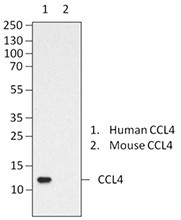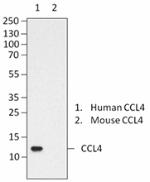- Clone
- W15138A (See other available formats)
- Regulatory Status
- RUO
- Other Names
- C-C motif chemokine 4, immune activation protein 2 (ACT-2), Macrophage inflammatory protein 1-beta, MIP-1beta, Protein H400, SIS-gamma, Small inducible cytokine A4
- Isotype
- Rat IgG2a, κ
- Ave. Rating
- Submit a Review
- Product Citations
- publications

-

50 ng of human CCL4 (lane 1) and mouse CCL4 protein (lane 2) were resolved by electrophoresis, transferred to nitrocellulose, and probed with purified monoclonal anti-CCL4 (clone W15138A) antibody. Proteins were visualized using an HRP Goat anti-rat IgG Antibody and chemiluminescence detection.
| Cat # | Size | Price | Quantity Check Availability | Save | ||
|---|---|---|---|---|---|---|
| 686202 | 100 µg | 231€ | ||||
CCL4 is an important proinflammatory cytokine involved in acute and chronic inflammatory responses. CCL4 attracts monocytes, natural killer (NK) cells, dendritic cells (DCs), and lymphocytes to sites of injury and inflammation. CCL4 signals through G-protein-coupled receptor CCR5. Because CCR5 is a major co-receptor for M-tropic HIV strains, the anti-HIV effects of CCL4 have been explored. Thus, the binding of CCL4 to CCR5 inhibits HIV entry and reduces the cell surface expression of CCR5. CCL4 has been identified as one of the major HIV-suppressive factors produced by CD8+ T cells. CCL4 also protects against type I diabetes by suppressing islet beta-cell inflammatory responses. In a rat model of experimental autoimmune encephalomyelitis, anti-CCL4 treatment using a neutralizing antibody significantly delayed the development and shortened the duration of the disease. Activated human peripheral lymphocytes secreted a truncated form of CCL4 that lacked the first two amino acids. CCR5 and truncated CCL4 bind to CCR1 and CCR2. Like CCL3, CCL4 is highly acidic and can form high-molecular weight polymers. Consistent with this observation, CCL4 is secreted as high molecular weight aggregates from HIV-I specific cytotoxic T lymphocytes. The polymerization of CCL4 is reversible and is important for in vivo activity. Heterodimers of CCL3 and CCL4 have also been described.
Product DetailsProduct Details
- Verified Reactivity
- Human
- Antibody Type
- Monoclonal
- Host Species
- Rat
- Immunogen
- Partial human CCL4 recombinant protein (24-92 a.a.) expressed in E. coli.
- Formulation
- Phosphate-buffered solution, pH 7.2, containing 0.09% sodium azide.
- Preparation
- The antibody was purified by affinity chromatography.
- Concentration
- 0.5 mg/ml
- Storage & Handling
- The antibody solution should be stored undiluted between 2°C and 8°C.
- Application
-
WB - Quality tested
- Recommended Usage
-
Each lot of this antibody is quality control tested by Western blotting. For Western blotting, the suggested use of this reagent is 0.5 - 2.0 µg per ml. It is recommended that the reagent be titrated for optimal performance for each application.
- RRID
-
AB_2616880 (BioLegend Cat. No. 686202)
Antigen Details
- Structure
- Chemokine. The 69 amino acid recombinant protein has a predicted molecular mass of approximately 7.8 kD.
- Distribution
- CCL4 is secreted by many mature hematopoietic cells including macrophages, T and B lymphocytes, neutrophils, dendritic cells, mast cells, and natural killer (NK) cells. Influenza virus-infected bronchial and nasal epithelial cells produce CCL4.
- Function
- CCL4 attracts monocytes, NK cells, dendritic cells, and T cells. CCL4 acts as a HIV-suppressive factor. Activating transcription factor 3 (ATF3) limits the amount of CCL4 released by macrophages. IFN-γ and NOS2 repress CCL3 and CCL4 in mouse macrophages via ATF3.
- Interaction
- Monocytes, NK cells, dendritic cells, and lymphocytes.
- Ligand/Receptor
- CCR5.
- Cell Type
- Macrophages, T cells, B cells, Neutrophils, Dendritic cells, Mast cells, NK cells
- Biology Area
- Cell Biology, Immunology, Innate Immunity, Neuroinflammation, Neuroscience
- Molecular Family
- Cytokines/Chemokines
- Antigen References
-
1. Raport CJ, et al. 1996. J. Biol. Chem. 271:17161.
2. Guan E, et al. 2001. J. Biol. Chem. 276:12404.
3. Guan E, et al. 2002. J. Biol. Chem. 277:32348.
4. Meagher C, et al. 2007. Diabetes 56:809.
5. Maurer M, von Stebut E. 2004. Int. J. Biochem. Cell Biol. 36:1882-6.
6. Cocchi F, et al. 1995. Science. 270: 1811.
7. Ren M, et al. 2010. EMBO J. 29:3952.
8. Kamin-Lewis R, et al. 2001. Proc. Natl. Acad. Sci. USA 98:9283.
9. Chandrasekar B, et al. 2013. J. Infect. Dis. 207:1556. - Gene ID
- 6351 View all products for this Gene ID
- UniProt
- View information about CCL4 on UniProt.org
Related FAQs
Other Formats
View All CCL4 Reagents Request Custom Conjugation| Description | Clone | Applications |
|---|---|---|
| Purified anti-CCL4 | W15138A | WB |
Compare Data Across All Formats
This data display is provided for general comparisons between formats.
Your actual data may vary due to variations in samples, target cells, instruments and their settings, staining conditions, and other factors.
If you need assistance with selecting the best format contact our expert technical support team.
-
Purified anti-CCL4

50 ng of human CCL4 (lane 1) and mouse CCL4 protein (lane 2)...

 Login / Register
Login / Register 







Follow Us